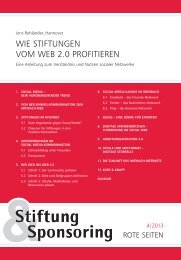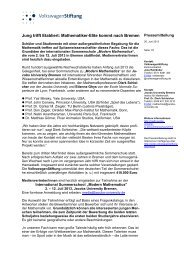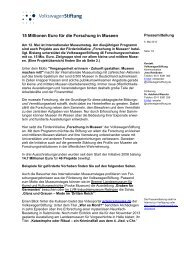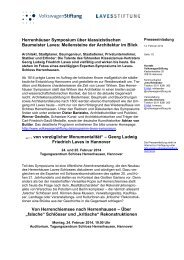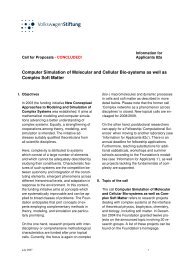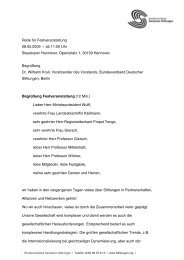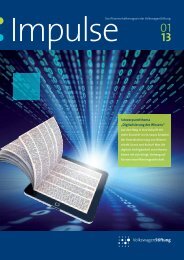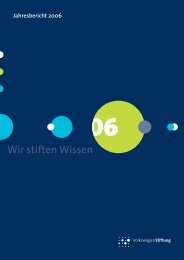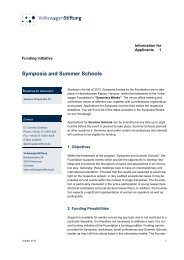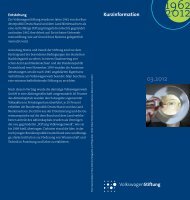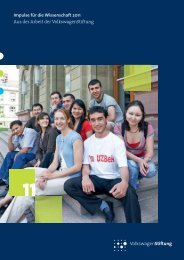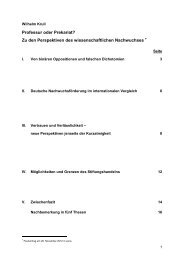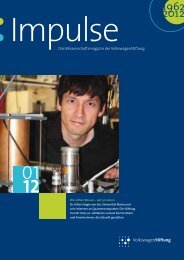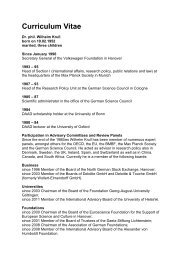Bewilligungen im Jahr 2008 - Volkswagen Stiftung
Bewilligungen im Jahr 2008 - Volkswagen Stiftung
Bewilligungen im Jahr 2008 - Volkswagen Stiftung
Erfolgreiche ePaper selbst erstellen
Machen Sie aus Ihren PDF Publikationen ein blätterbares Flipbook mit unserer einzigartigen Google optimierten e-Paper Software.
- 70 -<br />
Université de Cocody, Abidjan<br />
Laboratoire des Sciences et techniques de l'Eau et de l'Environnement (LSTEE)<br />
Dr. Kouassi Dongo<br />
B. P. 582<br />
Abidjan<br />
ELFENBEINKÜSTE<br />
Tel.: 00225 22483803<br />
____________<br />
Dakar<br />
Research for the development of business-oriented solutions for faecal sludge<br />
treatment in Dakar (Senegal)<br />
Bewilligung: 19.04.2011 Laufzeit: 1 <strong>Jahr</strong> 6 Monate<br />
Most urban areas of developing countries rely on latrine based sanitation. However,<br />
ongoing latrine programmes a<strong>im</strong>ed at achieving the Millennium Development Goals<br />
(MDG) still lack provision for the emptying, haulage, safe treatment and reuse of faecal<br />
sludge (FS) (Koné et al, 2007).This project a<strong>im</strong>s to introduce a new paradigm in<br />
sanitation by making excreta and wastewater management profitable for city planners,<br />
and thereby increase access to sanitation. To achieve this, the overall objective is to<br />
develop local capacity and create the know-how for operating FSTPs that produce safe<br />
biosolids and forage for enhancing urban and peri-urban agricultural productivity.<br />
University Cheikh Anta Diop de Dakar<br />
Institut des Sciences de l'Environnement<br />
Dr. Mbaye Mbéguéré<br />
P.O. 26469<br />
Dakar<br />
SENEGAL<br />
____________<br />
Egerton<br />
Use of sugarcane bagasse in biodigesters energy production for domestic and<br />
commercial use among resource poor in the sugar belts of Western Kenya<br />
Bewilligung: 19.04.2011 Laufzeit: 1 <strong>Jahr</strong> 6 Monate<br />
Supply of energy from the expensive and l<strong>im</strong>ited sources such as hydrometric plants to<br />
rural areas where commerce and industry is still at its low and have been a major<br />
hindrance for development of these rural areas in Kenya. Sustainable generation and use<br />
of biogas energy from cheap abundantly available sugarcane waste bagasse would<br />
create opportunities for employment creation, income generating activities and eventually<br />
help in combating extreme poverty experienced in these areas. Currently, bagasse is<br />
burned as a solid biofuel into charcoal at small-scale levels, but converting it into biogas<br />
would allow the energy containedin it to be used in a variety of activities such as lighting,<br />
cooking, driving small village based mills and even transport fuel. In this project, field<br />
research by constructing, processing, testing and analyzing the quality of biogas from<br />
different sugar belts in order to determine different rates of flow and plant uptake of<br />
bagasse will be carried out. Linkages to existing up-scaled biogas plants, markets and<br />
gas cylinder processing units will be carried out to ensure sustainability of the system.<br />
Egerton University, Njoro, Nakuru<br />
Agricultural Economics and Agribusiness<br />
Dr. George Owuor<br />
P.O. Box 536<br />
Egerton<br />
KENIA<br />
Tel.: + 254 722 831 634<br />
____________



